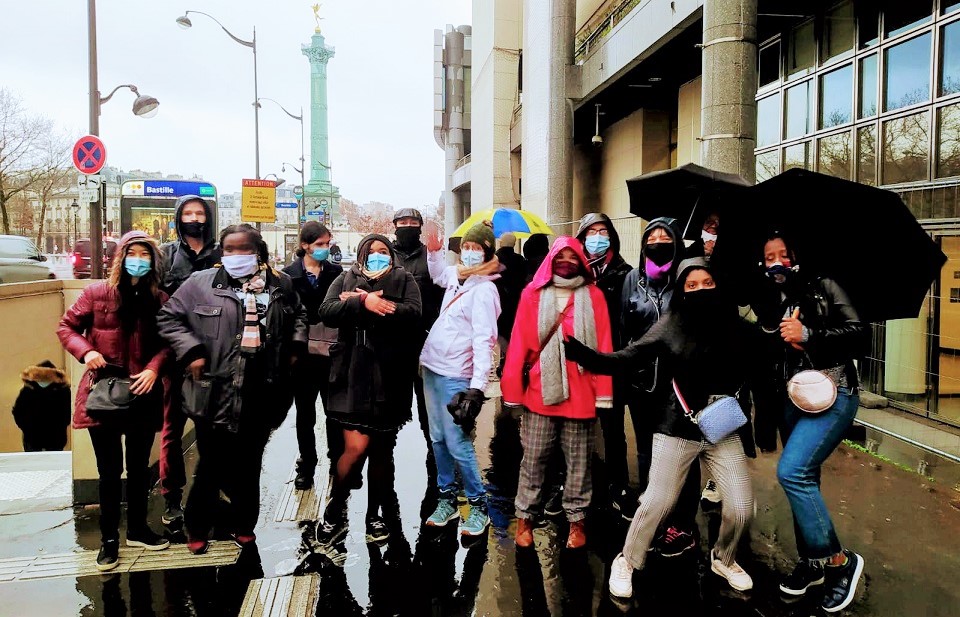Christian student groups in France open conversations about isolation and mental health
Anxiety and depression are “major issues” in times of lockdown, but “many Christian students have started reading the Bible one to one with non-believing friends”.
PARIS · 18 FEBRUARY 2021 · 12:41 CET

Signs of fatigue are seen in France as the government announced that restrictions (including a 6pm curfew and the closing of restaurants) would continue.
“There is a feeling of weariness, doubt and of a need to question”, admitted a spokesperson of President Emmanuel Macron’s political party to news service France 24. “Mental health, problems of depression and isolation” are a growing reality for many. Surveys show that less than half of the population would now approve to go into a third lockdown.
Since the start of the pandemic, over 77,000 people have died in France due to the Covid-19.
The struggle of “not giving up”
University students are amongst those most affected by the restrictions, as both study and social life have been severely limited and moved online.
“Succeeding in concentrating for the online courses” and “not giving up” are a struggle for many, says Marion Poujol, regional coordinator of GBU France (University Bible Groups) in the Paris area. But the deeper issue, she adds, is learning to “manage this loneliness”.
Aaron Robinson, national director of Agapé Campus, agrees. “Isolation” is the main challenge, he says, and it results in a “lack of physical activity and general motivation for many things, especially to stay concentrated on their studies”.
Patrick Nussbaumer, national director of Youth For Christ, points to a related side-effect of the restrictions, namely “home alone temptations”.
Caring about the students
A study by French newspaper Le Figaro found that 92% of students are worried about the current social and economic context, and 69% are concerned about their mental health.
It can be especially stressing to “project oneself into the future when everything is uncertain”, says Poujol. “Many have been struggling to find internships and positions in what is called L'alternance, the French work-study program which serves as an on-ramp to jobs after they graduate”, adds Robinson.
Others simply can no longer pay the rents or tuitions because their parents lost their jobs due to the pandemic.
Christian ministries have started a conversation about the “major issues” of anxiety and depression. Youth For Christ, for instance, has “broadcasted videos on those subjects, and had one to one conversations” with young people they serve.
Team members of GBU are in “contact with Christian psychologists and psychiatrists who can follow the students or advise the staff” when a difficult personal situation is detected.
At Agapé, they have been speaking to students “one on one, as well as trying to offer the context of community on a local level. This has mainly taken the form of Bible study, prayer, and social events online, with the occasional stroll outside in town when it is possible”.
The role of local churches
How can churches support students? Some are “reaching out to them, meeting them on their campuses, offering free food”, explains Nussbaumer. In a context of a pandemic, churches can feel powerless at times, but they should be aware of the difference it makes when they “care about the students” in simple ways, says Poujol.
Robinson give some examples. “I can think of three different cities in which food banks who have linked up with churches and student groups like ours to get food packages with a word of encouragement to French and foreign students who were in need”. Another group “partnered with the government-run student organization CROUS and a local boulangerie to pick up the bread and pastries that would otherwise be thrown away and redistribute them to students in need”.
Gospel witness in a pandemic
Even in the midst of a pandemic, “the mission continues” for Christian students, says Poujol. Surely, “it is more difficult to meet non-Christian students because the campuses are closed”, but “evangelistic meetings continue online. In the GBU, many Christian students have started reading the Bible one to one with non-believing friends”.
Students should “do everything that is allowed”, and this includes going “outside for walks whenever they can and meet students, especially foreign students who are very isolated”.
“Let the compassion of Christ fill us and flow through us at this time!”, says Robinson. “Whether it is one on one or as a group, Christian students can listen and care about their peers’ situation”.
Christian students “don’t have to pretend that they have it all together, because this situation has affected everyone, but they can give the gift of their presence and offer to pray for their friends and see how God leads them from there”.
An opportunity in Covid-19 times, is to “be innovative and bold in coming up with solutions to help those in need”, concludes Robinson.
Published in: Evangelical Focus - europe - Christian student groups in France open conversations about isolation and mental health
Since you are here…
Evangelical Focus is a news and opinion platform that brings together Christians from across Europe and other parts of the world. We need the support of our readers to make this media project sustainable in the long term. You can support our work! Read about Evangelical Focus’s sustainability here.
Would you like to support the work of Evangelical Focus?
Use one of these methods. You can also transfer your donation to “Areópago Protestante / Evangelical Focus” IBAN: ES8521000853530200278394 (Swift / BIC: CAIXESBBXXX). Subject: “Donation Evangelical Focus”
